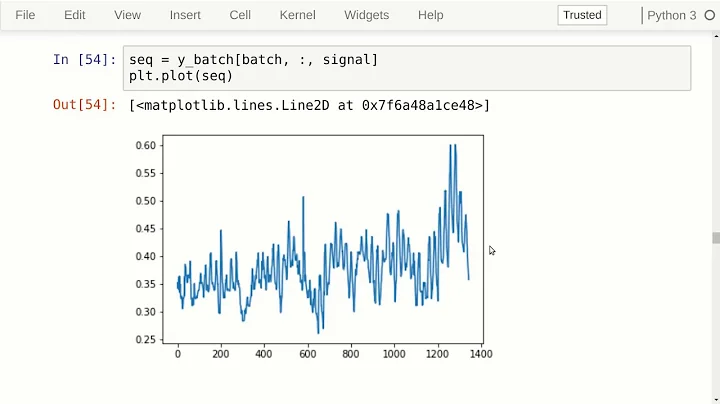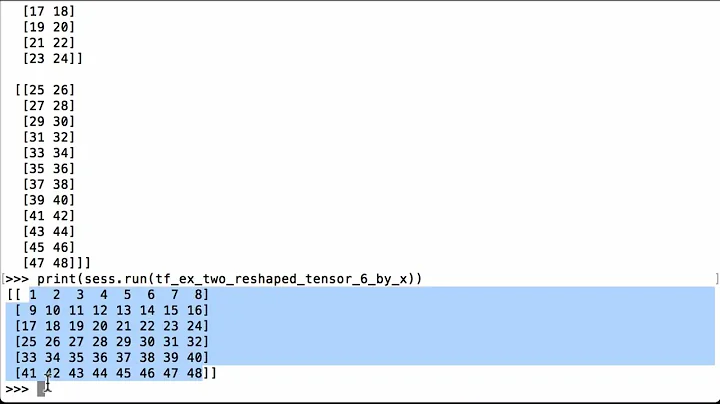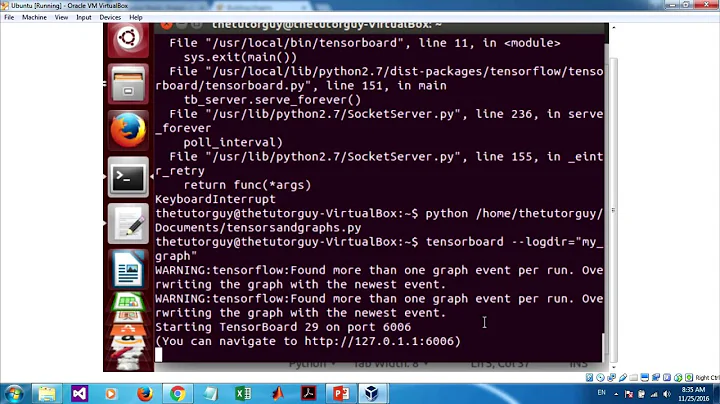How to get the dimensions of a tensor (in TensorFlow) at graph construction time?
Solution 1
Tensor.get_shape() from this post.
c = tf.constant([[1.0, 2.0, 3.0], [4.0, 5.0, 6.0]])
print(c.get_shape())
==> TensorShape([Dimension(2), Dimension(3)])
Solution 2
I see most people confused about tf.shape(tensor) and tensor.get_shape()
Let's make it clear:
tf.shape
tf.shape is used for dynamic shape. If your tensor's shape is changable, use it.
An example: a input is an image with changable width and height, we want resize it to half of its size, then we can write something like:
new_height = tf.shape(image)[0] / 2
tensor.get_shape
tensor.get_shape is used for fixed shapes, which means the tensor's shape can be deduced in the graph.
Conclusion:
tf.shape can be used almost anywhere, but t.get_shape only for shapes can be deduced from graph.
Solution 3
A function to access the values:
def shape(tensor):
s = tensor.get_shape()
return tuple([s[i].value for i in range(0, len(s))])
Example:
batch_size, num_feats = shape(logits)
Solution 4
Just print out the embed after construction graph (ops) without running:
import tensorflow as tf
...
train_dataset = tf.placeholder(tf.int32, shape=[128, 2])
embeddings = tf.Variable(
tf.random_uniform([50000, 64], -1.0, 1.0))
embed = tf.nn.embedding_lookup(embeddings, train_dataset)
print (embed)
This will show the shape of the embed tensor:
Tensor("embedding_lookup:0", shape=(128, 2, 64), dtype=float32)
Usually, it's good to check shapes of all tensors before training your models.
Solution 5
Let's make it simple as hell. If you want a single number for the number of dimensions like 2, 3, 4, etc., then just use tf.rank(). But, if you want the exact shape of the tensor then use tensor.get_shape()
with tf.Session() as sess:
arr = tf.random_normal(shape=(10, 32, 32, 128))
a = tf.random_gamma(shape=(3, 3, 1), alpha=0.1)
print(sess.run([tf.rank(arr), tf.rank(a)]))
print(arr.get_shape(), ", ", a.get_shape())
# for tf.rank()
[4, 3]
# for tf.get_shape()
Output: (10, 32, 32, 128) , (3, 3, 1)
Related videos on Youtube
Thoran
I am a Civil Engineer at skin but a programmer at heart. I developed Fold Dashboard for Chrome. Doing my best to turn my unknown unknowns into known unknowns and a tiny bit of that into my knowledge.
Updated on March 29, 2022Comments
-
Thoran about 2 years
I am trying an Op that is not behaving as expected.
graph = tf.Graph() with graph.as_default(): train_dataset = tf.placeholder(tf.int32, shape=[128, 2]) embeddings = tf.Variable( tf.random_uniform([50000, 64], -1.0, 1.0)) embed = tf.nn.embedding_lookup(embeddings, train_dataset) embed = tf.reduce_sum(embed, reduction_indices=0)So I need to know the dimensions of the Tensor
embed. I know that it can be done at the run time but it's too much work for such a simple operation. What's the easier way to do it? -
Thoran about 8 yearsWhile the answer I gave before you post yours was correct, your answer gives more information about the tensor than just its shape, hence, I accept it as the correct answer ;)
-
 Franck Dernoncourt about 7 yearsIf anyone wonders:
Franck Dernoncourt about 7 yearsIf anyone wonders:tf.shape(c)returns a 1-D integer tensor representing the shape ofc. In the example given in this answer,tf.shape(c)returnsTensor("Shape:0", shape=(2,), dtype=int32) -
Saeid BK about 7 years@nobar if the dimension is
None(i.e., if it is unspecified), you might need to usetf.shape(c). For example, ifa = tf.placeholder(tf.int32, (None,2)), and you runtf.Session().run(tf.constant(a.get_shape().as_list()[0]), {a:[[1,2]]})you will get error, but you can get the dimension by:tf.Session().run(tf.shape(a)[0], {a:[[1,2]]}). -
cliffberg over 6 yearsNone really - I was just trying to explain it as succinctly as possible ;-)
-
Mr_and_Mrs_D about 6 years
return tuple(tensor.get_shape().as_list())if you want a tuple, or directly return the python list as inreturn tensor.get_shape().as_list()









